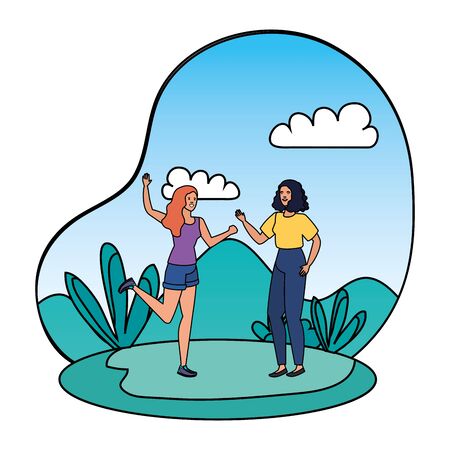Introduction to Women and Diversity in UK Hiking
The rolling hills, rugged coastlines, and sweeping national parks of the United Kingdom have long provided a dramatic backdrop for hiking enthusiasts. Yet, when reflecting on the history and current landscape of hiking events across the UK, a clear pattern emerges: participation has not always been equally accessible or welcoming to everyone. Traditionally, hiking communities were often dominated by a particular demographic—predominantly white, middle-class men. Over recent decades, however, there has been growing recognition of the need to broaden access and representation. Today, conversations about women’s involvement and greater diversity within UK hiking circles are more prominent than ever. Inclusivity is not just a buzzword but a vital consideration that shapes how groups organise walks, promote events, and support newcomers from all backgrounds. Creating inclusive spaces means that people of different genders, ethnicities, abilities, ages, and socioeconomic backgrounds can all find belonging and empowerment through outdoor experiences. In this article, we explore how the UK hiking scene is changing, share stories from women and underrepresented groups, and examine why fostering diversity is essential for the future health and vibrancy of Britain’s beloved walking culture.
2. Stories from the Trail: Women’s Experiences
The UK’s diverse landscape offers countless opportunities for women to connect with nature, challenge themselves, and find community through hiking. Yet, behind every ascent and muddy boot is a personal story worth sharing. In conversations with women hikers across England, Scotland, Wales, and Northern Ireland, a tapestry of experiences emerges—ranging from simple pleasures to life-changing journeys.
Everyday Moments on the Path
| Region | Personal Account |
|---|---|
| Lake District | "Most weekends, I head out with my local walking group. The peace of early mornings on Catbells gives me a sense of calm I rarely find elsewhere." – Sarah, Cumbria |
| South Downs | "It’s the small things—spotting wildflowers or sharing tea at the summit—that make each hike memorable." – Priya, Sussex |
| Cairngorms | "I joined a women-only hiking meet-up last winter. I was nervous at first, but everyone was welcoming, and now it feels like home." – Fiona, Aberdeenshire |
Inspiring Journeys and Firsts
- Overcoming Doubt: "I didn’t grow up outdoorsy. My first solo hike in Snowdonia was terrifying—and exhilarating. Now, it’s my favourite way to recharge." – Jade, Cardiff
- Pushing Boundaries: "Joining an all-women’s navigation course in Yorkshire helped me gain confidence—not just in map reading but also in speaking up and leading walks myself." – Emma, Leeds
- Building Community: "As a woman of colour, I initially felt out of place at large events. Finding groups that celebrate diversity made all the difference—I’ve met friends for life." – Fatima, London
Shared Themes: What Matters Most?
| Key Theme | Description/Examples |
|---|---|
| Belonging | Many women highlight the importance of feeling welcome in hiking communities and finding spaces where their identities are respected. |
| Safety and Support | The reassurance of walking in groups or having access to women-led events makes participation more accessible and enjoyable. |
| Growth Through Challenge | Tackling difficult routes or mastering new skills often leads to increased self-confidence both on and off the trails. |
| Cultural Representation | Diverse backgrounds enrich group experiences but also reveal where progress is still needed for true inclusion. |
These stories illustrate not only the joy that hiking brings but also the ongoing need to create spaces where every woman feels she belongs—from seasoned trailblazers to those taking their very first steps.

3. Barriers to Participation
Taking an honest look at the UK hiking community, its clear that women and minority groups face a unique set of barriers when it comes to joining and enjoying hiking events. Accessibility remains a major concern; many events are held in remote locations with limited public transport options, making it difficult for those without private vehicles or flexible schedules to participate. This logistical hurdle disproportionately affects people from lower-income backgrounds and urban areas, who may already feel disconnected from countryside traditions.
Representation is another pressing issue. Despite some progress, the stereotypical image of a hiker in the UK is still overwhelmingly white and male. This lack of visible diversity can create a sense of not belonging or even intimidation for women and people from ethnic minority backgrounds. It’s not just about who is present on the trails, but also about whose stories are being told by organisers, sponsors, and media outlets. When people don’t see themselves reflected in these spaces, it becomes harder to imagine themselves taking part.
Cultural challenges further complicate matters. For many women and members of minority communities, traditional gender roles or cultural expectations can act as subtle but powerful deterrents against participating in outdoor activities like hiking. Concerns about personal safety—especially for solo walkers or those travelling to unfamiliar rural areas—add another layer of anxiety. In some cases, religious dress codes or dietary restrictions can make participation logistically tricky if events do not offer inclusive facilities or food options.
The intersection of these barriers often means that women and diverse groups must overcome more than just physical challenges on the trail—they must also navigate social attitudes, practical hurdles, and cultural assumptions before they even lace up their boots. Addressing these obstacles requires more than token gestures; it demands genuine engagement with the lived experiences of underrepresented hikers in the UK.
4. Community Initiatives and Support Networks
Across the UK, a variety of community initiatives and support networks have emerged to encourage women and participants from diverse backgrounds to join hiking events. These groups not only provide practical support—such as equipment loans or guided walks—but also foster an inclusive culture where everyone feels welcome.
Local Groups Championing Diversity
Grassroots organisations play a pivotal role in bridging gaps for underrepresented communities. Groups like Black Girls Hike, Muslim Hikers, and Women’s Walking Collective actively organise accessible hikes, socials, and skill-building workshops tailored to their members needs. These groups often focus on creating safe spaces where cultural identity is celebrated alongside a love for the outdoors.
National Programmes and Partnerships
On a broader scale, national organisations collaborate with local authorities and charities to address systemic barriers. Initiatives such as The Ramblers’ ‘Walk Together’ programme and Sport England’s ‘This Girl Can’ campaign work to normalise diversity in outdoor activities by providing resources, training, and advocacy. Their efforts include subsidised travel, translation services, and dedicated support for first-time hikers.
Key Examples of Support Networks
| Organisation/Initiative | Main Focus | Support Offered |
|---|---|---|
| Black Girls Hike | Women of Colour | Guided group hikes, community forums, workshops |
| Muslim Hikers | Muslim Community | Culturally sensitive walks, prayer breaks, halal refreshments |
| The Ramblers – Walk Together | Diverse Public Participation | Inclusive events, route planning assistance, awareness campaigns |
| This Girl Can (Sport England) | Women of all Backgrounds | Campaigning, funding support, storytelling platforms |
| Pride Out | LGBTQ+ Inclusion | LGBTQ+-friendly walks, social meet-ups, online community support |
Through these collective efforts—rooted in both local passion and national strategy—the landscape of UK hiking is gradually becoming more reflective of its rich social fabric. The commitment of these groups demonstrates that real change happens when communities lead the way in breaking down barriers together.
5. Voices for Change: Perspectives from Organisers
In the ongoing conversation about women and diversity at UK hiking events, event organisers and group leaders play a crucial role in shaping the landscape. Their insights reveal both the progress made and the challenges that persist when it comes to promoting equity and inclusivity.
Championing Inclusive Initiatives
Many organisers have begun to recognise the importance of creating accessible environments for all participants, particularly women and those from underrepresented backgrounds. Some groups now offer women-only hikes or themed walks celebrating cultural festivals, while others provide detailed accessibility information and flexible participation options. These initiatives are not just about ticking boxes—they aim to foster genuine belonging and encourage first-time hikers who might otherwise feel excluded.
Barriers Still to Overcome
Despite these positive steps, organisers acknowledge that barriers remain. Common issues include a lack of diverse leadership within hiking groups, unconscious bias in promotional materials, and logistical challenges such as limited public transport links to rural trailheads. Leaders note that even well-intentioned efforts can fall short if they don’t address these deeper structural issues. For many, listening to feedback from attendees is essential for continuous improvement.
Learning from Each Other
One recurring theme is the value of collaboration—organisers often share experiences and resources with each other to refine their approaches. This might involve co-hosting events with local community groups or consulting with diversity experts to ensure best practices. By learning together, they hope to create more welcoming spaces for everyone who wants to enjoy the UK’s outdoors.
Looking Ahead
Ultimately, organisers express optimism about the future of hiking in the UK. There is a growing commitment to breaking down barriers and amplifying underrepresented voices on trails. As one organiser put it: “It’s about making sure everyone feels that sense of adventure is theirs for the taking.” Their perspectives underscore that progress requires both top-down support and grassroots innovation—key ingredients for meaningful, lasting change.
6. Looking Ahead: Building a More Inclusive Hiking Community
The journey towards greater diversity and inclusion at UK hiking events is ongoing, but there are practical steps that can help break down persistent barriers. Here are some recommendations for organisers, groups, and individuals striving to create a more welcoming environment for women and underrepresented communities.
Encourage Representation in Leadership
Start by ensuring event planning teams reflect the diversity you want to see among participants. Recruit women and individuals from varied backgrounds into leadership roles. This visible representation can inspire confidence and signal genuine commitment to inclusion.
Review Event Accessibility
Consider accessibility in its broadest sense. This means not just physical access—like step-free routes and clear signage—but also financial accessibility through sliding scale fees or subsidised places. Provide detailed information about route difficulty and logistics so everyone can make informed decisions before signing up.
Promote Safe and Supportive Spaces
Cultivate an environment where all hikers feel respected and heard. Establish clear codes of conduct, offer gender-neutral facilities where possible, and ensure there are channels for reporting concerns safely. Host pre-event meet-ups or online forums to ease anxieties for newcomers.
Collaborate with Diverse Organisations
Forge partnerships with community groups focused on women’s participation, ethnic minorities, LGBTQ+ hikers, and people with disabilities. Joint events or outreach campaigns can help broaden your reach and tap into valuable lived experience.
Celebrate Stories and Share Successes
Highlight positive stories of women and diverse hikers through blogs, talks, or social media. Sharing real experiences helps challenge stereotypes, raises visibility, and demonstrates the tangible benefits of an inclusive approach.
Keep Listening and Learning
No single initiative will solve every challenge overnight. Gather regular feedback from participants about what works and what doesn’t. Stay open to change, invest in diversity training for volunteers, and be ready to adapt as your hiking community grows ever more vibrant and inclusive.


